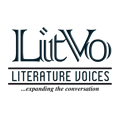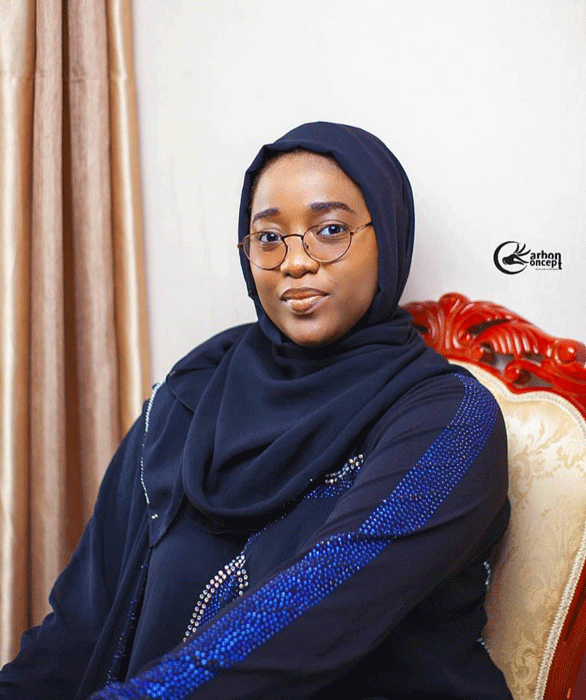“Creative Writing Provides Added Flavour to Journalism”INTERVIEW WITH SADA MALUMFASHI
By Haneefah Abdulrahman (Literature Voices)
(Sada Malumfashi is a writer and freelance journalist from Kaduna, Nigeria. He is a fellow of RSF Germany’s Berlin Scholarship Programme. He is the founder of the literary arts collective ‘Open Arts.’ He was among the participants in the Goethe Institute Nigeria-Cameroon Literary Exchange Program. He is an awardee of the Goethe Institute/Sylt Foundation Writing Residency through the Literary Exchange Program. He is interested in the intricacies of languages and works on translations bilingually in Hausa and English. His reports have been published in various media including The Africa Report, Saraba Magazine, This Is Africa, Asymptote and Music in Africa.)
Haneefah: Good day Sir, I am HANEEFAH ABDULRAHMAN from Literature Voices. We are humbled to have you here with us. Tell us a bit about yourself.
Sada: Hello Haneefah. I am Sada Malumfashi, a writer and freelance journalist. My works of fiction have appeared in Transition Magazine and New Orleans Review’s African Literary Hustle Issue. My essays and creative nonfiction have appeared or are forthcoming in AlJazeera, African Arguments, The Africa Report, Saraba Magazine, Enkare Review, This Is Africa and Music in Africa, amongst others. I was among the participants in the Goethe Institute Nigeria-Cameroon Literary Exchange Program. I am an awardee of the Goethe Institute/Sylt Foundation Writing Residency through the Literary Exchange Program. I am interested in the intricacies of languages and work on translations bilingually in Hausa and English. My poem and translations from Hausa have appeared in the National Translation Month Issue of 2017 and 2020.
Haneefah: Where do you belong? You are a Pharmacist, Writer, Journalist, Photographer, Arts Administrator and what again, please? What led to this confusion; unstable choices or, are you jack of all trade and master of all?
Sada: I am a pharmacist by training, a writer by nature and a journalist by passion. I dabble in Photography and as a Project Management Professional, it’s part of my professional work to ensure programming and organization in the cultural and creative sector. Maybe, that is the reason I wear so many caps.
Haneefah: There is a thin line between journalism and literature. What can you say about this statement as a possessor of both fields? Which one enhances the other?
Sada: I believe creative writing specifically provides an added flavour to a journalist. Everything in life involves strong telling and having that ability to weave facts into stories makes even news enjoyable. For me, the aim is to tell stories that will resonate with the reader at the end of the day, always.
Haneefah: What role does Photography play in Journalism and Literature?
Sada: It’s all about the visualization of data and facts. Especially now in a time of social and new media, photos play a huge role in providing visual aid to reportage. Photos have a power to drive narratives and their combination with storytelling is really huge.
Haneefah: There are so many amazing theories in journalism, also in literature. Which theorists are your favourites from both fields? What makes them justifiable to your practice of the both?
Sada: I’m not a scholar; so, I’m not very familiar with any of the theories. Maybe I’ll come for tutorial from you and brush up on the theories myself.
Haneefah: If you are asked to bring up a theory as a journalist and literati, what would that theory be?
Sada: I think I’m very practical in my work and not theoretical. So, I will definitely leave the development of theories to scholars and academics and hope to keep learning from the discourse.
Haneefah: Self-appraisal is allowed but some people shy away from it especially in public because they think it isn’t modest. A great writer described you as “A moving encyclopaedia of knowledge and wit”, please justify this by giving a self-appraisal of what must have informed such conclusion?
Sada: Amazing. I am interested in learning who that writer is. I am honoured. I don’t think it’s something that needs to be justified, it’s a personal opinion, and someone else might disagree with it. Personally, I am constantly developing and improving myself. I am a constant learner and reader, and I like to keep myself abreast with historical and contemporary world issues.
Haneefah: It takes a lot of courage to write non-fiction, it is like unravelling your heart to the world, it is like giving a mirror of you to the world. Writing non-fiction could lead to people having wrong judgement of you; yet, most of your works are non-fiction ranging from FINDING BINYAVANGA in SELVES which was published in 2019 to your recent work entitled SURVIVING LOVE AND PANDEMIC, which is published in Ayambalitcast to mention but a few. What keeps moving you into non-fiction?
Sada: Because it’s my reality, it’s the reality of the world. So, what’s there to be afraid of? Creative nonfiction is one of my favourite genres because it gives a perspective of our truths, of our experiences using immersive storytelling. It is always beautiful when done to perfection. The works drag me into non-fiction. I find the best way to tell certain stories is in this genre, other stories come out as fiction, others as poetry. So, it all depends on the form the story chooses.
Haneefah: Let’s assume the character BIYANVANGA in FINDING BIYANVANGA is a country, what kind of representation does he give?
Sada: What kind of representation does the country give? Maybe an upright one?
Haneefah: Few days back, your article NIGERIA’S RAILWAY PEOPLE: Life alongside a high-speed rail link was published in Aljazeera. Do you think your message in that article has had any effect on Nigeria, Nigerians and beyond? What brought about the muse for this article?
Sada: I will like to hope so. It’s a feature on the infrastructural resurgence currently happening in Nigeria and the massive fault-lines it comes with. I have plied the Abuja – Kaduna rail track on numerous occasions and apart from the usual congestion and tickets shortage, one thing I noticed is how the railway line passes through towns and villages without any reciprocal impact on these communities. I tried to imagine the plights of these people, these communities that always see the train pass daily but cannot afford to even be on it. So, I set out on a journey to document this perspective of the people in these communities.
Haneefah: You have an upcoming book entitled WORTH THE WEIGHT OF GOLD. Tell us, what does it contain in term of social function and changing the society?
Sada: Worth the Weight of Gold is a work in partnership with Gold West Africa. It’s a book that will chronicle the integral role that gold has played over the ages in the culture, traditions, art and economy of West Africa.
Haneefah: What can you say about women and literature in Northern Nigeria of today? Who are the female aces in today’s Northern Nigeria and the weight in Nigerian literary space?
Sada: Women have always been in the forefront of literature in northern Nigerian spaces. From the pioneering works of Zaynab Alkali, Hafsat Abdulwaheed, Balaraba Ramat Yakubu to the boom of the Hausa romance writers. Now, we have young women driving the discourse in the literary space, especially using poetry. The works of Hauwa Shafii, Hauwa Saleh, Maryam Bukar and Hassana Maina amongst others. It’s really a vibrant movement and we are lucky to be reading all of these voices.
Haneefah: How have you used your artistic prowess to help during the pandemic or have you said good bye to medical line?
Sada: We all needed to take a step back and do some introspection during the pandemic. That was what I did. I did not do much of writing, or any other activity but more of reflection. It was quite a weird time in history; one that we might not witness again in our lifetime. So, maybe I paid attention more to my mental health than anything else.
Haneefah: What are your limitations as a writer?
Sada: I see myself as my own greatest limitation. So I try to overcome myself and do better.
Haneefah: There are so many young and striving writers. The road to literary greatness appears too narrow in Nigeria. What advice can you give to them outside the cliche of “don’t be in a hurry to publish”
Sada: By all means put your works out there. Publish, publish, publish. Edit, edit, edit. Ensure that you put your best works out there.
Haneefah: You are also an art administrator. At which point do you manage art and where?
Sada: I am a Programme Management Specialist. That is my day to day work. I founded Open Arts as a means to provide another niche for the arts and literary space, especially in northern Nigeria. Over the last 2 years we have hosted a variety of events and engagements including the ‘Sembene Across Africa Documentary Screening.’ We are currently working on our first festival, the Hausa Kiswahili Festival of Arts (HAKIFA) with support from the New Arts New Audiences (NaNa) grant of British Council. We are looking forward to really diversifying the arts space on this part of the world.
Haneefah: Comment on the recent drive to leave Nigeria by young writers. Why are they absconding from the country to the west? Does it portend greater future for Nigerian literature or not?
Sada: I am not in the right position to comment about the lifestyle choices of people. First of all, writers are also humans and they have a freedom of movement like any other person. I don’t think it is right to place a burden of right on wrong on anybody based on their individual decisions. Literature will continue whether you and me are here or not. In 100 years, when we are long gone even from the earth, literature will thrive. It does not depend on anyone.
Haneefah: Thank you.
Sada: Thanks.
Haneefah AbdulRahman is a spoken word artiste, poet, writer, interviewer and social entrepreneur. She has published some of her articles, short stories and poems in different journals including the Nigeria Review. She is the Financial Secretary and Editor I of Creative Writers’ Club, Ahmadu Bello University, Zaria where she studies Literature. She is from Kogi State, Nigeria and lives in Kaduna. Email: abdulrahmanhanifah2017@gmail.com, IG: neefahwords, BLOG: trendyneefah.blogspot.com, Twitter: neefahwords_, Facebook: Haneefah Abdulrahman, YouTube: Hanifah Abdulrahman












Leave a Review